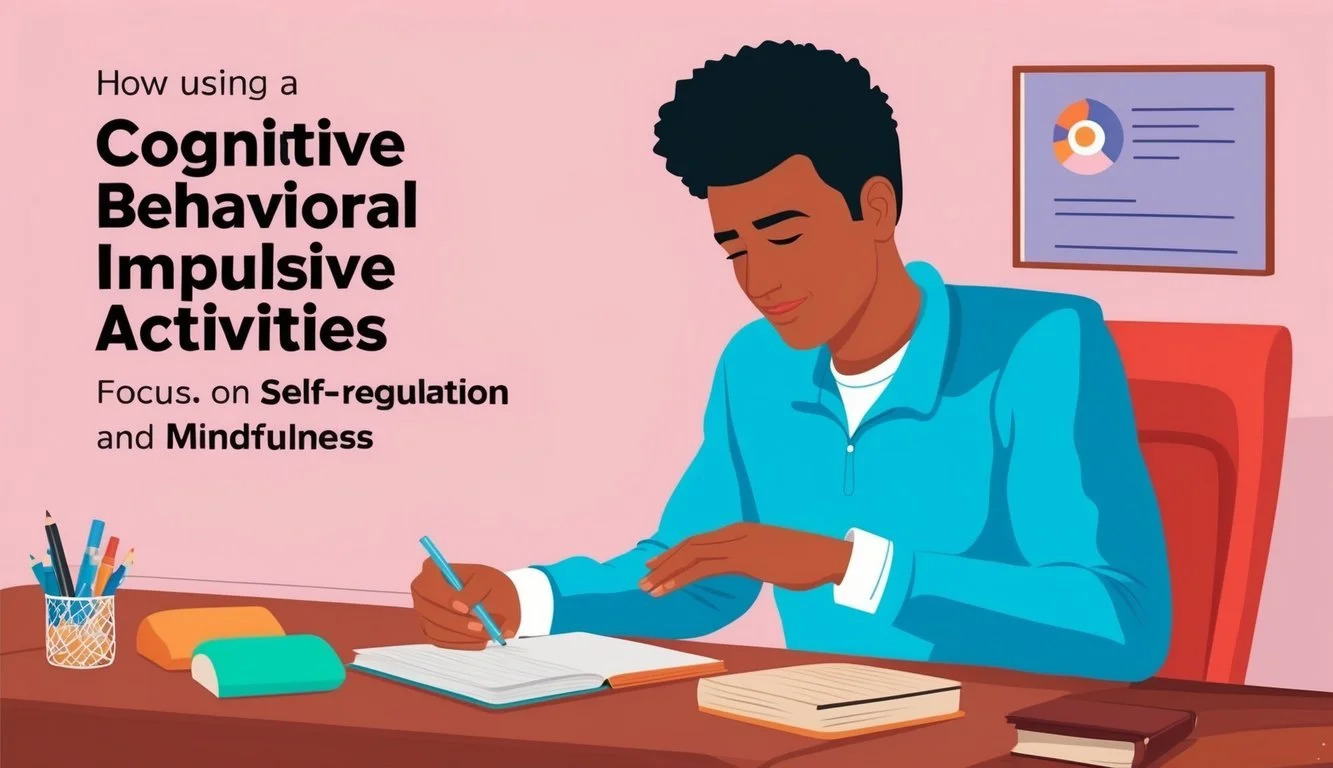Boost Self-Control: Engaging Impulsivity Activities for Adults
Impulsivity can pose challenges for adults in various aspects of life, from personal relationships to professional endeavors. Engaging in targeted activities can help individuals develop better impulse control and self-regulation skills. Effective impulse control activities for adults include interactive exercises, creative art therapy, and self-reflection techniques. A digital version of self-control games is also available, enhancing accessibility for adults.
These activities provide adults with practical tools to recognize impulsive urges and develop strategies to manage them. For example, expressive drawing exercises allow individuals to explore their emotions and create visual representations of their impulses. Interactive group activities, such as role-playing scenarios, can help adults practice skills in developing self-control abilities through engaging games. Emphasizing self control skills is crucial for managing thoughts and actions, especially for those who struggle with impulsivity.
Regular practice of these impulse control activities can lead to improved decision-making, stronger relationships, and enhanced overall well-being. By incorporating these exercises into their daily routines, adults can cultivate greater self-awareness and develop the skills needed to navigate life’s challenges with more composure and thoughtfulness.
Introduction to Executive Functioning Skills
Executive functioning skills are a set of high-level cognitive processes that enable individuals to plan, organize, and execute tasks effectively. These skills encompass self-regulation, working memory, attention, and problem-solving. Among these, self-regulation stands out as the ability to control one’s emotions, thoughts, and behaviors in response to various situations. Developing strong executive functioning skills, including self-regulation, is essential for achieving success in academic, professional, and personal settings. By teaching self-control and self-regulation skills, individuals can improve their ability to manage stress, make better decisions, and achieve their goals. Enhancing these skills not only fosters better behavior management but also contributes to overall emotional and mental well-being.
Understanding Impulsivity in Adults
Impulsivity in adults manifests as actions taken without forethought or consideration of consequences. It often stems from a desire for immediate gratification and can significantly impact daily life and long-term outcomes.
Developing appropriate responses is a critical component of managing impulsivity, enabling adults to control impulses and engage in activities despite their initial reluctance.
Learning to control emotions is also a critical component of managing impulsivity, as it helps in regulating behavior and impulses across various situations.
Adults with impulsive tendencies may struggle with:
Interrupting conversations
Making hasty decisions
Engaging in risky behaviors
Difficulty with emotional regulation
Challenges in professional settings
Impulsivity can affect various aspects of an adult’s life, including relationships, career progression, and personal well-being. It may lead to financial difficulties, legal troubles, or strained interpersonal connections.
The causes of impulsivity in adults are multifaceted. Factors can include:
• Neurological differences • Mental health conditions • Substance use disorders • Stress and environmental factors
While some aspects of impulse control may decline with age, life experience and learned strategies can help adults manage impulsive urges more effectively.
Recognizing impulsive behaviors is the first step toward developing better control. Adults who identify these tendencies can work on implementing techniques to pause and reflect before acting, ultimately leading to more conscious decision-making.
Common Causes of Impulsivity
Impulsivity in adults stems from a complex interplay of neurological, psychological, and environmental factors. These influences can manifest in various ways, affecting decision-making and behavior. Access to the right resources, such as worksheets and structured curricula, can significantly help in managing impulsivity.
Neurological Factors
Brain structure and function play a crucial role in impulsive behaviors. The prefrontal cortex, responsible for executive functions like decision-making and impulse control, may be underdeveloped or less active in impulsive individuals. Teaching self-control skills through engaging activities and games can help manage these impulsive behaviors effectively.
Reconnecting with their bodies through activities like yoga can also help individuals manage impulsive behaviors by improving self-regulation and emotional control.
Neurotransmitter imbalances, particularly involving dopamine and serotonin, can contribute to impulsivity. These chemical messengers regulate mood, reward, and inhibition.
Conditions like ADHD and bipolar disorder are strongly linked to impulsive tendencies. They often involve alterations in brain circuitry that affect self-control and emotional regulation.
Psychological Triggers
Stress and anxiety can overwhelm coping mechanisms, leading to impulsive actions as a form of escape or relief. When under pressure, individuals may act without considering long-term consequences. Teaching self-control skills through engaging activities and games can help manage these impulsive behaviors effectively.
Learning to tolerate sensations can help individuals manage impulsive behaviors by allowing them to better handle their emotions, behavior, and reactions in various situations.
Mood disorders, such as depression, can impair judgment and increase the likelihood of rash decisions. Emotional instability often accompanies impulsive behaviors.
Low self-esteem may drive impulsivity as individuals seek immediate gratification or validation. This can manifest in risky behaviors or sudden life changes.
Environmental Influences
Substance abuse significantly impacts impulse control. Alcohol and drugs can impair judgment and lower inhibitions, leading to reckless actions.
Social pressure and peer influence can prompt impulsive behavior, especially in group settings. The desire to fit in or impress others may override rational decision-making.
Unstable home environments or traumatic experiences can disrupt the development of healthy coping mechanisms. This may result in impulsive behaviors as a means of dealing with emotions or situations.
Media and technology exposure can reinforce instant gratification, potentially increasing impulsive tendencies. Constant stimulation may reduce attention spans and patience.
Creating a structured room environment can help manage impulsive behaviors by providing a controlled space where activities are designed to teach self-control.
Teaching self-control skills through engaging activities and games can help manage impulsive behaviors, especially for those who struggle with impulsivity.
Importance of Regulation Skills
Regulation skills are crucial for individuals to manage their emotions, behaviors, and thoughts effectively. Self-regulation skills, such as impulse control and self-monitoring, enable individuals to respond to situations in a thoughtful and intentional manner.
Developing strong regulation skills can lead to better academic and professional performance, stronger relationships, and improved physical and mental health. Moreover, regulation skills are essential for children to develop social skills, manage their emotions, and behave appropriately in different situations.
Engaging in self-control games can effectively help children learn these necessary skills while also making the process enjoyable. By teaching children self-regulation skills, parents and educators can help them develop the necessary skills to succeed in school and life.
These skills are foundational for navigating social interactions and achieving long-term personal and professional goals.
Introduction to Control Games
Control games are an essential tool for teaching children and young adults self-regulation skills, impulse control, and self-control. These games are designed to help individuals practice self-control, making it easier for them to manage their emotions, behaviors, and reactions to different situations.
Self-control games can be played in various settings, including classrooms, therapy sessions, and at home, making them a versatile and effective way to teach self-regulation skills.
By incorporating control games into daily life, individuals can develop the necessary skills to succeed in school, personal relationships, and future careers.
Assessment Techniques for Impulsivity
Accurate measurement of impulsivity is crucial for effective intervention and treatment planning. Various methods can provide insights into impulsive tendencies and behaviors in adults. Teaching self-control skills through engaging activities and games can help manage impulsive behaviors effectively.
Self-Report Inventories
Self-report questionnaires offer a standardized approach to assessing impulsivity. The UPPS-P Impulsive Behavior Scale is a widely used tool that measures five distinct facets of impulsivity. Self-report inventories provide a comprehensive view of impulsive behaviors, similar to how an entire game offers a complete experience.
These include negative urgency, lack of premeditation, lack of perseverance, sensation seeking, and positive urgency. Participants rate their agreement with statements on a Likert scale.
Other common self-report measures include the Barratt Impulsiveness Scale (BIS-11) and the Dickman Impulsivity Inventory. These tools can reveal patterns in thought processes and behaviors related to impulsivity. Teaching self-control skills through engaging activities and games can be crucial for managing these impulsive behaviors.
Behavioral Observations
Direct observation of behavior provides valuable data on impulsive actions. Clinicians may use structured tasks or simulations to assess impulse control in real-time. Observing motor actions can provide valuable insights into impulsive behaviors. Teaching self-control skills through engaging activities and games can be crucial for managing impulsive behaviors.
The Go/No-Go task is a computerized test that measures response inhibition. Participants must quickly respond to certain stimuli while refraining from responding to others.
Another method is the Iowa Gambling Task, which assesses decision-making under uncertainty. It reveals tendencies towards immediate rewards versus long-term consequences.
Naturalistic observation in daily settings can also yield insights into impulsive behaviors and their triggers.
Clinical Interviews
Structured clinical interviews allow for in-depth exploration of impulsive tendencies. Clinicians can probe specific incidents, patterns, and contexts of impulsive behavior. Emphasizing self-control skills through engaging activities and games can be crucial in managing these impulsive behaviors.
The Structured Clinical Interview for DSM-5 (SCID-5) includes modules relevant to impulsivity assessment. It helps identify related disorders such as ADHD or borderline personality disorder.
Open-ended questions about decision-making processes, risk-taking behaviors, and emotional regulation provide rich qualitative data. This method allows for a nuanced understanding of an individual’s unique impulsivity profile.
Cognitive Behavioral Strategies
Cognitive behavioral strategies offer effective tools for managing impulsivity in adults. These approaches focus on identifying triggers, changing thought patterns, and developing healthier responses. Teaching self-control skills through engaging activities and games can further help in managing impulsive behaviors. Additionally, cognitive behavioral strategies can be used to teach skills for managing impulsivity, helping individuals practice and strengthen essential skills in a fun, engaging way.
Impulse Control Training
Impulse control training helps adults recognize and manage urges to act impulsively. One key technique is the “stop and think” method. When faced with an impulse, individuals pause to consider potential consequences before acting. Teaching self-control skills through engaging activities and games can further aid in managing impulsive behaviors. A leader can guide individuals through impulse control training exercises, fostering skills such as self-control and observation.
Another useful strategy is stimulus control. This involves modifying one’s environment to reduce temptations. For example, removing credit cards from wallets can help curb impulsive spending.
Role-playing exercises allow adults to practice impulse control in various scenarios. These simulations build confidence and prepare individuals for real-life situations.
Problem-Solving Techniques
Effective problem-solving skills can significantly reduce impulsive behaviors. The first step is clearly defining the problem at hand. This helps focus attention on finding a solution rather than reacting impulsively. Teaching self-control skills through engaging activities and games can further aid in managing impulsive behaviors. Problem-solving techniques can also be taught in a class setting to improve impulse control.
Brainstorming multiple solutions is crucial. Adults learn to generate several options before choosing a course of action. This process encourages thoughtful decision-making.
Pros and cons analysis is another valuable technique. By weighing the potential outcomes of each solution, individuals make more informed choices.
Implementing and evaluating the chosen solution completes the problem-solving cycle. This reflection helps refine decision-making skills over time.
Delaying Gratification Exercises
Learning to delay gratification is essential for managing impulsivity. One effective exercise is the “10-minute rule.” When faced with an impulse, adults wait 10 minutes before acting. This pause often reduces the urge’s intensity. It makes sense to practice delaying gratification to improve impulse control. Teaching self-control skills through engaging activities and games can further help manage impulsive behaviors.
Visualization techniques can also be helpful. Imagining future rewards for resisting immediate impulses strengthens self-control.
Goal-setting exercises encourage long-term thinking. By focusing on larger objectives, adults become less likely to succumb to short-term impulses.
Mindfulness practices, such as deep breathing or meditation, can increase awareness of impulsive urges. This heightened awareness allows for better self-regulation.
Benefits of Control Games
Control games, such as self-control board games, are an effective way to teach individuals self-regulation skills. These games provide a fun and interactive way to practice self-control, impulse control, and self-monitoring. By playing control games, individuals can develop their ability to wait, take turns, and regulate their emotions. Control games also help in developing social skills, such as communication, cooperation, and empathy. Moreover, control games can be adapted to meet the needs of different age groups and skill levels, making them an excellent resource for parents, educators, and therapists. These games not only make learning self-regulation enjoyable but also foster a supportive environment for practicing these essential skills. Great games can effectively teach self-regulation skills, making them accessible and simple tools for development.
Games to Practice
There are various games that can be used to practice self-control and self-regulation skills. Classic games like Red Light Green Light, Simon Says, and Freeze Dance are excellent for teaching children self-control, impulse control, and self-monitoring. A fun game like Simon Says can help teach self-control skills by encouraging children to follow instructions and adhere to rules while having fun. These games require participants to follow instructions carefully and control their actions, which helps in developing self-regulation skills. Other games, such as Jenga and Self-Control Speedway, can be used to practice decision-making and problem-solving skills. Additionally, games like the Social Problem Solving Board Game and Role Play can be used to teach social skills and self-regulation. By incorporating these games into daily routines, individuals can develop their self-regulation skills and improve their ability to manage stress and achieve their goals. These activities not only make learning fun but also provide practical ways to enhance self-control and emotional regulation.
Games to Practice Regulation Skills
There are numerous games available that can help individuals practice regulation skills, including self-control board games, card games, and outdoor activities. These games are designed to target specific self-regulation skills, such as waiting, taking turns, and self-monitoring. Examples of games that practice regulation skills include Red Light, Green Light, Simon Says, and Freeze Dance. These games are not only fun but also provide an opportunity for individuals to develop essential life skills, such as impulse control, self-awareness, and social skills. By practicing regulation skills through games, individuals can improve their ability to self-regulate, leading to better behavior management, coping skills, and overall well-being.
Control Game Examples
Several control game examples can be used to teach self-regulation skills, including Jenga, Self-Control Speedway, and Blurt. These games are designed to challenge individuals to practice self-control, making them an effective way to teach self-regulation skills. For instance, Jenga requires players to take turns removing blocks from a tower, promoting self-control and fine motor skills. Self-Control Speedway, on the other hand, is a board game that targets self-control skills, such as decision-making and problem-solving. By playing these games, individuals can develop the necessary skills to succeed in various aspects of life, including academics, personal relationships, and future careers.
Equipment Needed for Games
The equipment needed for control games varies depending on the specific game. Some games, such as Red Light, Green Light, require minimal equipment, while others, like Jenga, require a game board and blocks. Digital versions of control games are also available, making it possible for individuals to play games on their devices. When choosing equipment for control games, it’s essential to consider the age and skill level of the players, as well as the specific self-regulation skills being targeted. By selecting the right equipment, individuals can ensure that they are providing an effective and engaging way to teach self-regulation skills.
Mindfulness and Meditation Practices
Mindfulness and meditation offer powerful tools for managing impulsivity in adults. These practices cultivate present-moment awareness and self-regulation skills. Regular engagement can lead to improved impulse control and emotional balance. Additionally, teaching self-control skills through engaging activities and games can further help manage impulsive behaviors. Mindfulness and meditation practices can also benefit a child in managing impulsivity.
Focused Breathing
Focused breathing is a fundamental mindfulness technique that helps calm the mind and reduce impulsive reactions. To practice, find a comfortable seated position and close your eyes. Direct your attention to the natural flow of your breath. Notice the sensation of air entering and leaving your nostrils or the rise and fall of your chest.
Focused breathing can also be practiced in a classroom to help students manage impulsivity. When thoughts arise, gently redirect your focus back to your breath without judgment. Start with 5-minute sessions and gradually increase the duration. This exercise enhances concentration and creates a pause between impulse and action. Teaching self-control skills through such activities is essential for managing impulsive behaviors.
Consistency is key. Aim to practice focused breathing daily, ideally at the same time each day. This routine helps build the neural pathways associated with improved impulse control.
Body Scanning
Body scanning promotes awareness of physical sensations and can interrupt impulsive patterns. Begin by lying down or sitting comfortably. Close your eyes and systematically focus your attention on different parts of your body, starting from your toes and moving upward.
Notice any tension, discomfort, or pleasant sensations in each area. Avoid trying to change anything; simply observe. This practice cultivates a non-reactive awareness of bodily experiences.
Regular body scans can increase sensitivity to physical cues that often precede impulsive behaviors. This heightened awareness provides an opportunity to pause and make more conscious choices. Additionally, body scanning can be part of self control activities to manage impulsivity. Teaching self-control skills through engaging activities and games can further help manage impulsive behaviors.
Mindful Observation
Mindful observation exercises train the mind to focus on external stimuli, reducing internal distractions that can lead to impulsivity. Choose an object in your environment - a flower, a pebble, or a piece of artwork. Examine it closely for several minutes.
Notice its colors, textures, and patterns. Engage all your senses in the observation process. When your mind wanders, gently bring your attention back to the object.
Mindful observation can also enhance social emotional learning by improving emotional awareness and interpersonal skills. This practice strengthens attention span and develops the ability to stay present. It can be particularly helpful for adults who struggle with impulsivity triggered by environmental stimuli. Teaching self-control skills through engaging activities and games can further aid in managing impulsive behaviors.
Incorporate mindful observation into daily activities like eating or walking. This integration helps extend the benefits beyond formal practice sessions.
Lifestyle Modifications
Implementing certain lifestyle changes can significantly improve impulse control in adults. These modifications target key areas that influence brain function and emotional regulation.
Teaching self-control skills through engaging activities and games can also help manage impulsive behaviors effectively. Most children can benefit from these lifestyle modifications to manage impulsivity.
Dietary Adjustments
A balanced diet plays a crucial role in managing impulsivity. Foods rich in omega-3 fatty acids, such as salmon, walnuts, and flaxseeds, support brain health and cognitive function. Reducing sugar and processed food intake can help stabilize blood sugar levels and mood. Dietary adjustments can significantly impact the impulsivity of one child.
Complex carbohydrates found in whole grains provide steady energy, preventing sudden crashes that may trigger impulsive behavior. Incorporating more fruits and vegetables ensures a steady supply of vitamins and minerals essential for neurotransmitter production.
Limiting caffeine and alcohol consumption can also improve impulse control. These substances can disrupt sleep patterns and affect decision-making abilities. Additionally, teaching self-control skills through engaging activities and games can further help manage impulsive behaviors.
Physical Activity
Regular exercise is a powerful tool for managing impulsivity. Aerobic activities like running, swimming, or cycling increase blood flow to the brain, enhancing cognitive function and emotional regulation. Physical activity can also help children control their impulsive behaviors. Teaching self-control skills through engaging activities and games can further help manage impulsive behaviors.
Strength training exercises can boost self-discipline and focus. Yoga and tai chi combine physical movement with mindfulness, promoting better impulse control.
Aim for at least 150 minutes of moderate-intensity exercise per week. Even short bursts of activity, like a 10-minute walk, can have immediate positive effects on mood and impulse control.
Sleep Hygiene
Adequate sleep is crucial for maintaining impulse control. Adults should aim for 7-9 hours of quality sleep each night. Establishing a consistent sleep schedule helps regulate the body’s internal clock. Adequate sleep can also improve impulse control in social situations, helping individuals navigate challenging social interactions. Developing self-control skills can also aid in managing impulsive behaviors, making it easier to stick to a healthy sleep routine.
Creating a relaxing bedtime routine can improve sleep quality. This may include activities like reading, gentle stretching, or meditation. Avoid screens for at least an hour before bed, as blue light can disrupt melatonin production.
Ensure the sleep environment is conducive to rest. Keep the bedroom dark, quiet, and cool. Investing in a comfortable mattress and pillows can significantly improve sleep quality.
Support Systems and Group Activities
Support systems and structured group activities play a crucial role in managing impulsivity in adults. These approaches provide outlets for energy, opportunities for connection, and strategies for developing self-control. Teaching self-control skills through engaging activities and games can further help individuals manage their thoughts and actions effectively. Following rules in group activities can also help manage impulsive behaviors.
Support Groups for Impulse Control
Support groups offer a safe space for adults struggling with impulsivity to share experiences and coping strategies. These groups often focus on specific challenges like ADHD, addiction, or compulsive behaviors.
Participants benefit from peer support and practical advice. Many groups incorporate skill-building exercises to improve impulse control. Teaching self-control skills through engaging activities and games can be particularly effective in managing impulsive behaviors. Support groups can teach self-control skills to manage impulsive behaviors through structured activities and interactive games.
Some support groups use a 12-step model, while others follow cognitive-behavioral approaches. Online forums and virtual meetings have made these groups more accessible.
Group Therapy Sessions
Group therapy provides a structured environment for addressing impulsivity under professional guidance. Sessions typically involve 6-12 participants and a trained therapist. Group therapy can also help develop social skills alongside managing impulsivity.
Activities may include role-playing, mindfulness exercises, and problem-solving scenarios. These sessions help members develop self-awareness and practice impulse control techniques.
Group therapy often incorporates cognitive-behavioral strategies to identify and change impulsive thought patterns. Members learn to recognize triggers and implement coping mechanisms. Additionally, teaching self-control skills through engaging activities and games is emphasized to help manage impulsive behaviors effectively.
Recreational Clubs and Activities
Recreational clubs offer positive outlets for impulsive energy. Sports teams, art classes, and hobby groups provide structured environments for channeling spontaneity.
These activities promote focus, discipline, and social connection. Team sports teach cooperation and impulse control within a competitive framework.
Creative pursuits like painting or music allow for expression while developing patience and concentration. Outdoor clubs engage participants in challenging activities that require planning and self-control.
A self control board game can be used in recreational clubs to teach self-regulation skills through interactive and enjoyable gameplay.
Many clubs organize regular meetups and events, providing a consistent schedule for adults managing impulsivity. Additionally, these activities can help develop self-control skills, which are essential for managing thoughts and actions effectively.
Pharmacological Interventions
Medication can play a significant role in managing impulsivity for some adults. Various pharmacological options target different aspects of impulse control, offering potential benefits alongside important considerations. Additionally, teaching self-control skills through engaging activities and games can be crucial for managing impulsive behaviors.
Medication Options for Managing Impulsivity
Stimulant medications like methylphenidate and amphetamines are commonly prescribed for impulsivity associated with ADHD. These drugs increase dopamine and norepinephrine levels in the brain, improving focus and reducing impulsive behaviors. Medication is part of the entire game plan for managing impulsivity, ensuring a comprehensive approach to treatment.
Non-stimulant options include atomoxetine, a norepinephrine reuptake inhibitor that can help with impulse control. Guanfacine and clonidine, originally developed as blood pressure medications, have shown efficacy in managing impulsivity.
Some antidepressants, particularly SSRIs like fluoxetine and sertraline, may help reduce impulsive behaviors in certain individuals. Mood stabilizers such as lithium or valproic acid can be beneficial for impulsivity related to bipolar disorder. Additionally, teaching self-control skills through engaging activities and games can be crucial for managing impulsive behaviors, especially for those who struggle with impulsivity.
Potential Side Effects and Considerations
Common side effects of stimulant medications include decreased appetite, sleep disturbances, and increased heart rate. Non-stimulants may cause fatigue, dry mouth, or gastrointestinal issues.
It’s crucial to start with low doses and adjust gradually under medical supervision. Regular monitoring of blood pressure, heart rate, and weight is important, especially with stimulant medications. It is also important to explain potential side effects and considerations to patients to ensure they are well-informed.
Some medications may interact with other drugs or medical conditions. A thorough medical history and ongoing communication with healthcare providers are essential for safe and effective treatment.
Individual responses to medications vary, and finding the right treatment often requires a trial-and-error approach. Combining pharmacological interventions with behavioral strategies typically yields the best results for managing impulsivity. Additionally, teaching self-control skills through engaging activities and games can be highly effective in helping individuals manage impulsive behaviors.
Setting and Achieving Personal Goals
Goal setting is a powerful tool for personal growth and achievement. Adults can benefit from engaging in structured activities to define and pursue their objectives. Teaching self-control skills through engaging activities and games can also help manage impulsive behaviors, making it easier to stay focused on goals. Additionally, setting and achieving personal goals can teach skills for managing impulsivity.
One effective approach is creating a vision board. This visual representation of goals helps maintain focus and motivation. Collect images, words, and symbols that represent desired outcomes and arrange them on a board.
Mind mapping offers another creative method. Start with a central goal and branch out into smaller, related objectives. This technique helps identify connections between different aspirations and potential steps to reach them.
Journaling provides a space for reflection and progress tracking. Regular entries about goals, challenges, and successes can offer valuable insights and maintain momentum.
SMART goal setting ensures objectives are Specific, Measurable, Achievable, Relevant, and Time-bound. This framework increases the likelihood of success by providing clear criteria for each goal.
Accountability partners can significantly boost goal achievement. Pairing up with a trusted friend or colleague to share progress and challenges creates external motivation and support.
Breaking larger goals into smaller, manageable tasks makes them less overwhelming. Create a list of actionable steps and celebrate each accomplishment along the way.
Regular review and adjustment of goals is crucial. Set aside time monthly or quarterly to assess progress and make necessary modifications to stay on track.
Long-term Management of Impulsivity
Managing impulsivity is an ongoing process that requires consistent effort and dedication. Individuals can develop effective strategies to control impulsive behaviors over time. Teaching self-control skills through engaging activities and games can be particularly beneficial for managing impulsive behaviors. Long-term management strategies can also enhance social emotional learning, fostering better decision-making and social interactions.
Establishing a maintenance plan serves as a roadmap for continued progress. This plan should include regular check-ins with a mental health professional to assess progress and adjust strategies as needed.
Cognitive-behavioral therapy (CBT) offers valuable tools for long-term impulsivity management. CBT helps individuals recognize impulsive urges and develop coping mechanisms to handle them effectively.
Mindfulness practices can be incorporated into daily routines to increase self-awareness and reduce impulsive reactions. Regular meditation or deep breathing exercises can help individuals pause before acting on impulses.
Creating a supportive environment is crucial for sustained success. This may involve:
Removing triggers
Setting up reminders for self-control techniques
Engaging in regular physical exercise
Maintaining a consistent sleep schedule
Developing healthy habits and routines can provide structure and stability, reducing the likelihood of impulsive behaviors. Consistent practice of impulse control techniques strengthens self-regulation skills over time.
Tracking progress using impulsivity worksheets or journals allows individuals to identify patterns and celebrate improvements. This self-reflection process reinforces positive changes and motivates continued efforts.









